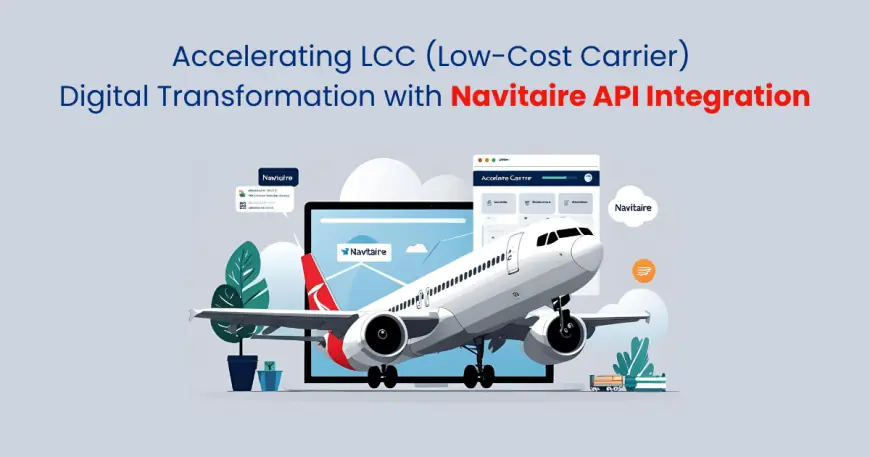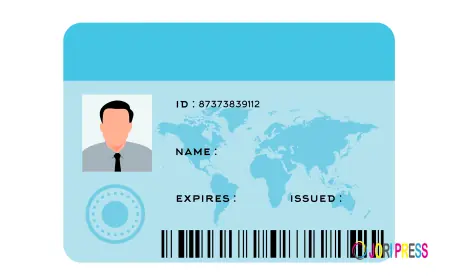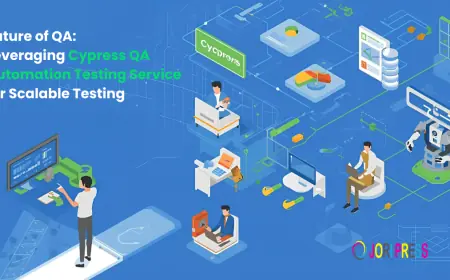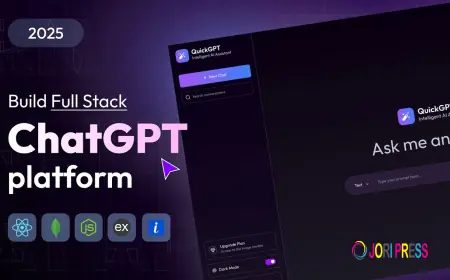Accelerating LCC (Low-Cost Carrier) Digital Transformation with Navitaire API Integration
Navitaire API Integration helps LCCs boost digital transformation, streamline bookings, and enhance customer experiences across platforms.

Low-cost carriers (LCCs) have fundamentally reshaped air travel by focusing on affordable fares and operational efficiency. However, in today’s digital era, low pricing alone isn’t enough. Passengers expect frictionless mobile bookings, personalized offers, quick check-ins, and real-time updates. To meet these evolving demands, LCCs are undergoing digital transformation.
One powerful enabler of this transformation is the Navitaire API integration—a modern suite of APIs designed to support the next generation of travel experiences, specifically tailored for LCCs and hybrid airlines. This blog explores how Navitaire APIs can help LCCs fast-track innovation, improve operational efficiency, and unlock new revenue streams.
The Evolving Landscape of Low-Cost Carriers (LCCs)
LCCs dominate the short-haul travel market by offering basic no-frills services at competitive prices. However, modern travelers want more than just affordability. They seek convenience, customization, and connectivity across digital channels.
The shift is driven by:
-
Growing mobile-first travelers
-
Competitive pressure from full-service carriers adopting digital tactics
-
Need for non-fare revenue from ancillaries
-
Regulatory expectations for passenger rights and transparency
To remain competitive, LCCs must build agile and intelligent digital ecosystems that can support this shift while staying lean.
Why Digital Transformation is Crucial for LCCs
Digital transformation enables LCCs to automate manual processes, personalize customer interactions, and create a consistent brand experience across web, mobile, and physical touchpoints. More importantly, it allows carriers to generate new revenue opportunities without increasing operating costs.
Core Objectives:
-
Improve Direct Sales Channels: Drive bookings through web and mobile instead of third-party platforms.
-
Optimize Operational Efficiency: Streamline check-ins, baggage handling, and customer support with automation.
-
Enhance Ancillary Revenue: Upsell products like seat upgrades, meals, baggage, and insurance dynamically.
-
Deliver Personalized Offers: Use real-time passenger data to tailor recommendations.
Without flexible API-based systems, achieving these goals becomes complex and resource-intensive. This is where Navitaire steps in.
Overview of Navitaire and Its API Capabilities
Navitaire, a subsidiary of Amadeus, offers New Skies, a cloud-based passenger service system built for low-cost and hybrid airlines. What sets Navitaire apart is its API-first design, enabling seamless integration with various digital platforms.
Navitaire API Features:
-
Provides access to core airline functions: reservations, inventory, ticketing, and check-in.
-
Supports both SOAP and REST interfaces, ensuring flexibility.
-
Built with modularity in mind, allowing airlines to integrate only the components they need.
-
Designed for high scalability, capable of handling large transaction volumes.
-
Offers near real-time data interactions, which is essential for personalization and dynamic pricing.
Key Benefits of Navitaire API Integration for LCCs
1. Faster Time-to-Market
APIs reduce development cycles by offering ready-to-integrate functionality. LCCs can launch or update mobile apps, websites, and kiosks without rebuilding systems from scratch.
2. Greater Control Over Direct Channels
By integrating Navitaire APIs into their own apps or websites, LCCs reduce dependency on Online Travel Agencies (OTAs) and Global Distribution Systems (GDS), thus saving on commission costs.
3. Increased Ancillary Sales
APIs provide detailed access to ancillaries like baggage, meals, and upgrades. LCCs can present these options during and after booking, maximizing upsell opportunities.
4. Personalization with Real-Time Data
APIs give access to customer preferences, travel history, and loyalty data. This allows dynamic pricing, tailored marketing, and relevant notifications.
5. Future-Proof Scalability
Whether launching in new markets or handling flash sales, API integrations ensure systems can scale without performance degradation.
Core Modules Enabled Through API Integration
Navitaire APIs are divided into various functional areas. Each one supports a crucial part of the passenger experience and operational cycle:
• Booking & Reservations
Allows passengers to search flights, view fares, and book seats. This module also supports itinerary modifications and cancellations.
• Ticketing & Payments
Facilitates secure payment processing, ticket issuance, and fare rules application. It supports various payment gateways and currencies.
• Ancillaries
Handles add-on services such as preferred seating, baggage, in-flight meals, insurance, and lounge access—all integrated into the booking flow.
• Loyalty & Customer Profile
Access and update frequent flyer details, store personal information, and manage travel preferences. This module powers loyalty-based offers.
• Check-in & Boarding
Automates online and mobile check-in, boarding pass generation, seat allocation, and pre-boarding announcements.
• Flight Status & Alerts
Enables real-time flight tracking, delay notifications, and gate changes through SMS, push, or email.
Real-World Use Cases: Transforming the LCC Experience
1. Mobile Booking App
An airline app built on Navitaire APIs lets passengers book flights, manage reservations, and check in—all from their phone—without relying on third-party tools.
2. Dynamic Ancillary Sales
During the booking or check-in process, the airline uses passenger data to present relevant upsell options like extra baggage or seat upgrades.
3. Loyalty and CRM Integration
Customer loyalty points are updated in real time when a booking is made or a service is used. This data syncs with CRM systems to tailor future offers.
4. Self-Service Kiosks
Airports equipped with kiosks connected via Navitaire APIs allow self-check-in, bag tagging, and boarding pass printing, reducing queue times.
Integration Architecture and Best Practices
While Navitaire provides robust APIs, their implementation within your tech stack should follow best practices to ensure smooth operation and long-term maintainability.
Key Considerations:
-
Middleware Layer: Acts as a translator between the Navitaire APIs and your customer-facing platforms.
-
Microservices Architecture: Breaks down the system into manageable services that handle booking, payments, loyalty, etc.
-
Load Management: Use caching mechanisms and queue systems to balance traffic during high booking periods.
-
API Gateway: Manages access, throttling, and routing for different services.
By following these patterns, airlines avoid bottlenecks and system failures, especially during high-traffic events like flash sales or holiday seasons.
Security, Scalability & Monitoring
1. Security:
Navitaire API supports token-based authentication and ensures secure communication through encryption. For LCCs handling online payments, compliance with data protection regulations like PCI-DSS is essential.
2. Scalability:
API-based architecture supports elastic scaling. Whether it’s handling 1,000 or 100,000 daily bookings, the system can auto-scale to meet demand.
3. Monitoring:
Monitoring tools help identify API failures, latency, and performance issues. Real-time dashboards can be configured to alert the airline IT teams about outages or unusual activity.
Challenges and How to Overcome Them
|
Challenge |
Solution |
|
Complex documentation and onboarding |
Work with certified Navitaire implementation partners. Use sandbox environments to test before live deployment. |
|
Data synchronization delays |
Design asynchronous data handling using message queues for background processes. |
|
Integration with older systems |
Use API gateways and abstraction layers to bridge legacy systems with modern interfaces. |
|
Change management and testing |
Implement staging environments and version control to avoid production disruptions. |
Future-Proofing LCCs with Navitaire APIs
The airline industry is heading towards AI-driven personalization, voice-assisted bookings, and intelligent operations powered by IoT and data analytics. Navitaire’s API-driven ecosystem is designed to support these innovations.
-
Voice Interfaces: Integrate booking or flight status services with Alexa or Google Assistant.
-
Chatbots: Allow instant support and bookings via WhatsApp or web chat.
-
Real-Time Personalization: AI models can access passenger data via APIs and push context-aware offers.
-
Smart Airports: Use Navitaire APIs to feed check-in and boarding data into airport management systems.
By building on Navitaire’s APIs, LCCs not only modernize for today—they prepare for what’s next.
Conclusion
For LCCs, digital transformation is not optional—it's essential for survival and growth. Navitaire API integration provides the backbone for building smart, scalable, and customer-centric airline systems. Whether it's enabling seamless bookings, increasing ancillary revenue, or personalizing services, Navitaire empowers LCCs to deliver high-quality digital experiences at low operational costs.
Investing in API-first strategies today ensures LCCs stay agile, competitive, and future-ready in an ever-evolving aviation landscape.
FAQs
1. What makes Navitaire suitable for LCCs?
Navitaire is built specifically for low-cost and hybrid airlines. It offers flexible, modular APIs that support cost-effective digital transformation.
2. Is Navitaire only for bookings?
No. It supports a full range of airline functions including loyalty, ancillary services, check-in, ticketing, and real-time notifications.
3. Can Navitaire be integrated with mobile apps and websites?
Yes. Navitaire APIs are designed for seamless integration into any front-end platform—be it mobile, web, or kiosk.
4. Is the Navitaire API secure?
Yes. It follows strict security protocols including token-based access, encryption, and compliance with global standards like PCI DSS.
5. Can Navitaire APIs scale for large airlines?
Absolutely. Many leading LCCs worldwide rely on Navitaire to handle millions of transactions per day.
What's Your Reaction?
 Like
0
Like
0
 Dislike
0
Dislike
0
 Love
0
Love
0
 Funny
0
Funny
0
 Angry
0
Angry
0
 Sad
0
Sad
0
 Wow
0
Wow
0

















































